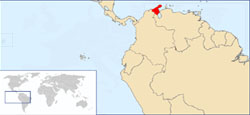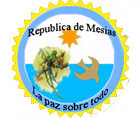Mesías
From Ipon
| |||||||
| Motto: '"La paz sobre todo"' | |||||||

| |||||||
| Mesias @ Simtropolis | |||||||
| Capital | Santa Leon | ||||||
| Largest city | Santa Leon | ||||||
| Official language(s) | Spanish | ||||||
| Government Governor
| Territory of San Pedro Jorge Cortona | ||||||
| Republic Colonization Communist Revolution Annexed by San Pedro | 1512 1930 1978 | ||||||
| Area • Total • Water (%) | {{{area}}} km² {{{percent_water}}} | ||||||
| Population • 2007 est. • 2006 census • Density | 4,600,200 ({{{population_estimate_rank}}}) 5,623,250 700/km² (2) | ||||||
| GDP (PPP) • Total • Per capita | | ||||||
| HDI | {{{HDI}}} | ||||||
| Currency | Corona (Cr)
| ||||||
| Time zone • Summer (DST) | Eastern Standard Time (UTC-1) -5 (UTC{{{utc_offset_DST}}}) | ||||||
| Internet TLD | {{{cctld}}} | ||||||
| Calling code | +{{{calling_code}}}
| ||||||
Mesias Mesias is a small territorial group of islands off the coast of Central America belonging to San Pedro. The capital is Santa Leon. Mesias is the second smallest country in South America behind French Guiana. Mesias is still a developing country, despite years of economic aid from neighboring oil-rich Venezuela. Mesias is just slightly wealthier than Brazil, but poorer than Colombia. A majority of Mesias is located on the Guajira peninsula while the southern region is located at the end of the Andes mountain range. Mesias consists of three provinces, Guajira, Maraibo and Barranqo. The capitals being Santaleon for Guajira, Costa Merced for Maraibo and Popayan for Barranqo.
Contents |
History
Before San Pedrian fleets arrived there was a small but thriving pre-Colombian civilization called Calinque in the mountains near modern-day Aguasantos. Eventually discovered by the Pedrianos who had already pillaged the larger ancient port city of Tukali (modern day Santa Leon), they stole the gold and sent it back to San Pedro. Aguasantos was built in it's place.
The Pedrians built a colony in the region. Jesuit priests created missions and converted the natives to Christianity. One of the priests who served at a native clinic had a vision and was later canonized in 1980 as the patron saint of Mesias.
When the colony seperated from San Pedro it initially collapsed into poverty. It suffered with poverty untl the early 1950's when a communist rebellion started. Juan Garcia Rumpez took control as a communist dictator, with strong ties to Cuba. The nation stayed under communist rule until an American envoy started installing "Capitalist" dictators in Latin America. Juan Garcia Rumpez was assassinated by an unknown rebel and his brother, Raul Alonso took control until 1970. He then fell from power due to a democratic revolution and a Republic was formed. When first founded the Republic was very conservative due to a large influence from the Catholic Church. Sadly, many of the leaders were assassinated by leftist rebels and the country fell back into the hands of San Pedro, as the nation was very poor and almost on the verge of collapsing.
Government
Mesias is a Democratic Republic slowly tilting to the Left of the political spectrum. The dominant party is the Izquierdistas (Leftist) Party with Jorge Cortona as the president.
Industry
Mesias' industry consists mostly of Agriculture, Manufacturing, and oil. Bananas and Coffee are the highest exports out of the country and have given wealth to the developing country.
Public Health
Mesias has a Socialized Healthcare System in which doctors work for the government.
Culture
Mesias has a rich culture which is a combination of native traditions from the ancient Olmec and Mestizo tribes, Religious observances from the Spanish colonial era, and some african traditions brought by slaves.
Religion
A majority of Mesias is Roman Catholic, with many supporters of Liberation Theology. Mesias' patron saint is the Virgin of Guavalupe. Also there is a large Muslim minority from Nigeria, North Africa and from former slaves who were brought to work in the sugar plantations. There is a Jewish community mostly from Eastern Europe and some Protestant Denominations brought via American missionaries.


